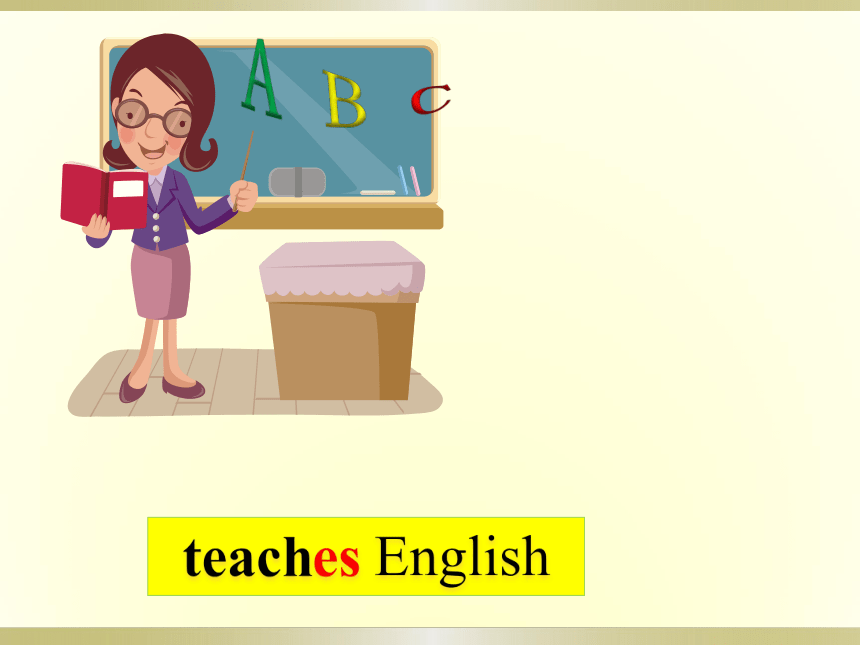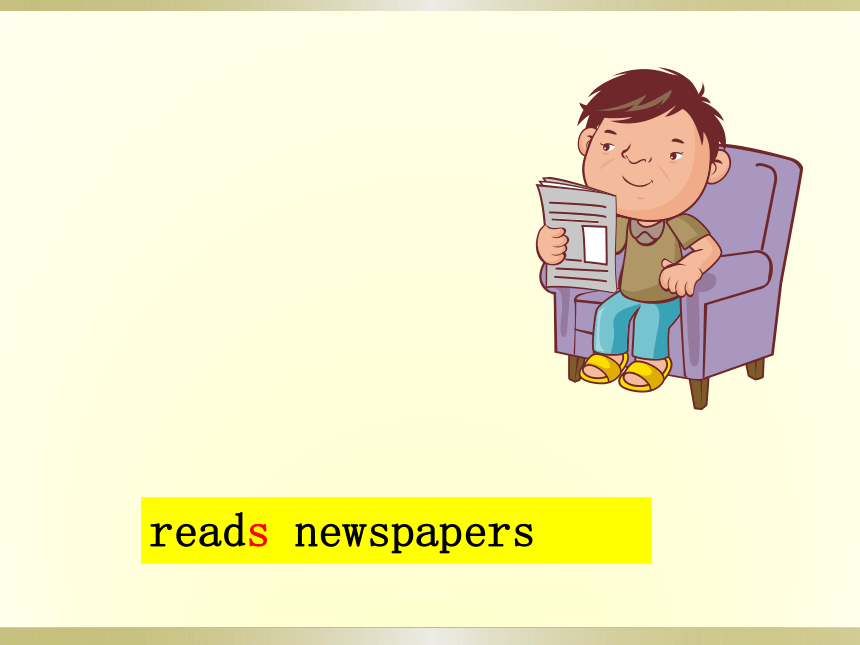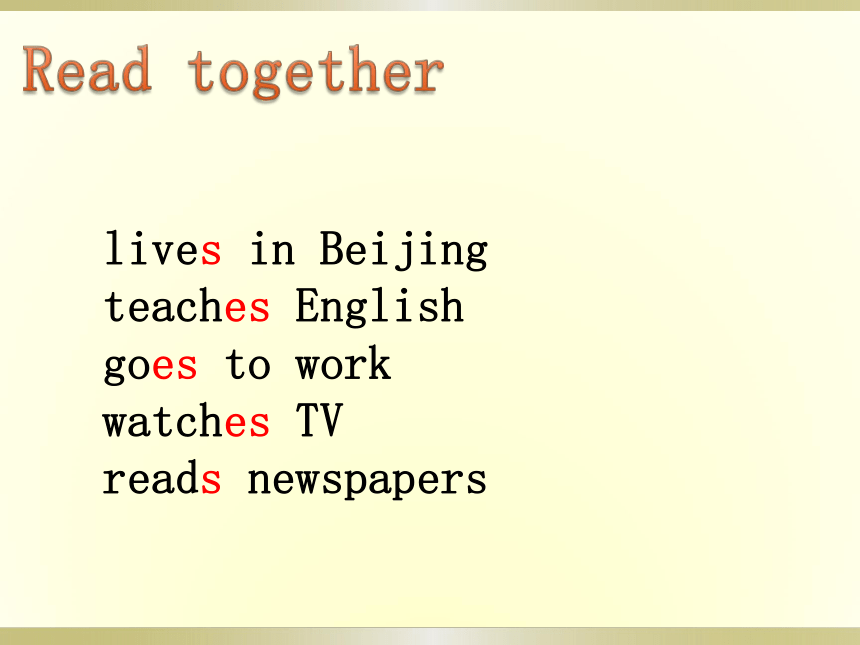六年级上unit 4 I have a pen pal Part B let’s talk
文档属性
| 名称 | 六年级上unit 4 I have a pen pal Part B let’s talk |

|
|
| 格式 | rar | ||
| 文件大小 | 1.5MB | ||
| 资源类型 | 教案 | ||
| 版本资源 | 人教版(PEP) | ||
| 科目 | 英语 | ||
| 更新时间 | 2011-11-21 00:00:00 | ||
图片预览







文档简介
(共16张PPT)
B . Let’s talk
teaches English
goes to work
watches TV
reads newspapers
lives in Beijing
teaches English
goes to work
watches TV
reads newspapers
live
go
watch
teach
read
swim
s
es
es
es
s
s
Miss Shen
live
go
watch
teach
read
swim
I
in Linlai.
to work on foot.
TV at night.
English everyday.
newspapers everyday.
in the sea.
当主语是第三人称单数的时候,动词就得变化。一般加”s”,如:
like—likes live—lives
read—reads ride —rides
play —plays
以o / ch / sh / s / x结尾,加”es”:
do—does go—goes
wash—washes
teach—teaches
watch—watches
fly—flies
study—studies
carry—carrries
have—has
He lives in Shanghai.
He teaches English .
He goes to school by bus .
He reads books at night .
He likes collecting stapms .
Mr. Black
Does she teach English
Does she teach Chinese
Does she teach math
No , she doesn’t .
No , she doesn’t .
Yes , she does .
Does he live in the country
No, he doesn’t.
He lives in the city.
goes to work by bike
goes to work by subway
watches TV in the evening
reads newspapers in the evening
Does he/she…
Yes, he/she does.
No, he/she doesn’t.
Hobby
running
playing games
singing
playing basketball
Summary(小结):
3、没有be动词,没有情态动词的句子变一般疑问句,需加助动词do ;当主语是第三人称单数时加助动词does,动词要还原为原形。如:He goes to work by bus. 变为一般疑问句:Does he go to work by bus Yes,he does./ No, he doesn’t.
一般疑问句
1、找be(am, is, are )动词,把be动词提到句子开头,并加问号(?)。
2、找情态动词(can, must, may ,could等),把情态动词提到句子前面,其余不变,并交问号(?)。
B . Let’s talk
teaches English
goes to work
watches TV
reads newspapers
lives in Beijing
teaches English
goes to work
watches TV
reads newspapers
live
go
watch
teach
read
swim
s
es
es
es
s
s
Miss Shen
live
go
watch
teach
read
swim
I
in Linlai.
to work on foot.
TV at night.
English everyday.
newspapers everyday.
in the sea.
当主语是第三人称单数的时候,动词就得变化。一般加”s”,如:
like—likes live—lives
read—reads ride —rides
play —plays
以o / ch / sh / s / x结尾,加”es”:
do—does go—goes
wash—washes
teach—teaches
watch—watches
fly—flies
study—studies
carry—carrries
have—has
He lives in Shanghai.
He teaches English .
He goes to school by bus .
He reads books at night .
He likes collecting stapms .
Mr. Black
Does she teach English
Does she teach Chinese
Does she teach math
No , she doesn’t .
No , she doesn’t .
Yes , she does .
Does he live in the country
No, he doesn’t.
He lives in the city.
goes to work by bike
goes to work by subway
watches TV in the evening
reads newspapers in the evening
Does he/she…
Yes, he/she does.
No, he/she doesn’t.
Hobby
running
playing games
singing
playing basketball
Summary(小结):
3、没有be动词,没有情态动词的句子变一般疑问句,需加助动词do ;当主语是第三人称单数时加助动词does,动词要还原为原形。如:He goes to work by bus. 变为一般疑问句:Does he go to work by bus Yes,he does./ No, he doesn’t.
一般疑问句
1、找be(am, is, are )动词,把be动词提到句子开头,并加问号(?)。
2、找情态动词(can, must, may ,could等),把情态动词提到句子前面,其余不变,并交问号(?)。
同课章节目录
